Chainlink Product Update: Q2 2023
Web3 gives builders new superpowers—the power to build applications that can’t be shut down, that are guaranteed to run as promised, and that can represent, hold, and move value. These superpowers make it possible to serve the increasing demand from consumers to fully own their data, their assets, and the contracts they enter into. This is why Web3 is inevitable: Consumers will demand it, and developers will build it. We can accelerate this transition by making it easy for developers to build with these new superpowers. This is why we are building the Chainlink platform.
At SmartCon 2022, we shared our vision of Chainlink as the industry-standard Web3 services platform for empowering Web3 builders—giving developers a universal connectivity layer between blockchains and real-world data, legacy systems, off-chain computation, and other blockchain networks. Our vision is to provide a self-service platform where builders can quickly access a wide range of pre-built and time-tested services while also having the flexibility to build their own custom solutions. Our platform is built around three pillars—data, compute, and cross-chain capabilities—which are reflected in new products such as low-latency Data Feeds, Functions, and CCIP. Q2 has been another strong quarter of heads-down execution to realize this expansive platform vision.
A huge advantage of adopting the Chainlink platform is that once you use a single Chainlink service, there are little-to-no additional trust assumptions for using other Chainlink services since they are all built upon the same time-tested oracle infrastructure. And every new service built on top of Chainlink adds more value for all existing users. This is why blockchains are increasingly joining the Scale program as a way to accelerate the growth of their application ecosystems, because an integration with Chainlink can bring multiple services to a single blockchain and a subsequent surge in developer activity. We call this dynamic the Chainlink Effect.
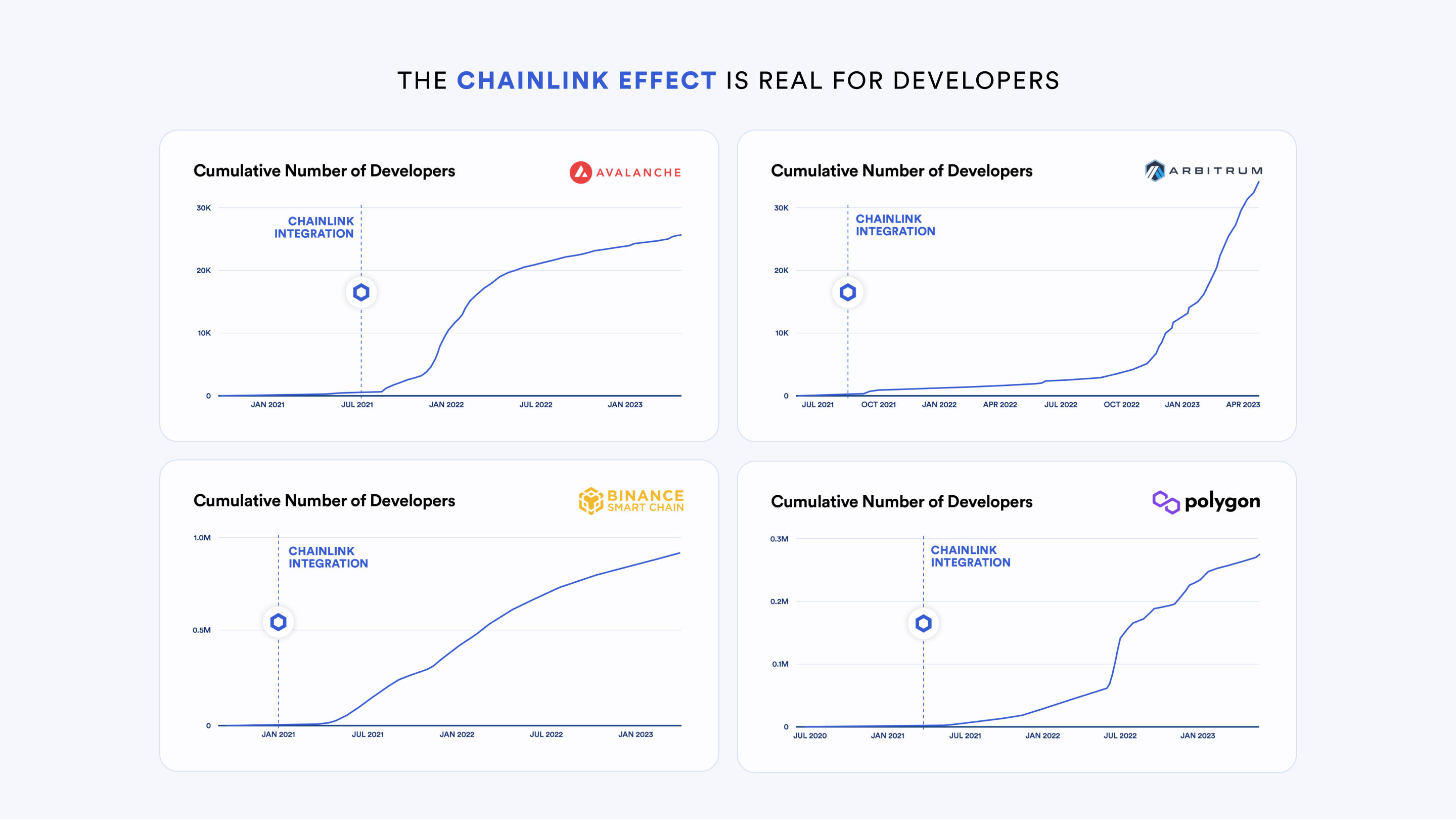
The platform vision of a universal connectivity layer is also attractive to industry leaders across Web2, as highlighted in the recent blockchain interoperability collaboration between Chainlink and major financial institutions. Real builders understand the importance of working with an industry standard that has a proven track record of securing over $7 trillion in on-chain transaction value and consistently releases new and improved oracle solutions.
None of this would be possible without the awesome Chainlink community. One of our goals is to keep the Chainlink and wider Web3 community up to date with the development of Chainlink’s platform through the release of regular product updates. The first product update covered two quarters (Q4 2022 – Q1 2023) and presented a detailed vision for each Chainlink service. This update will focus on deployments for Q2 2023. We’ll also be hosting a Q&A on the Chainlink Official Discord related to this product update on Thursday, June 22 at 1:00PM ET. Please use this form to submit a question. We’ll be collecting questions until 12:00PM ET on Tuesday, June 20.
Please note that all future-facing comments are subject to change based on user feedback, shifts in consumer demand, strategic determination, and various other unforeseen challenges. The goal of this product update is to provide insight into current thinking based on ongoing research and development, but it is not a definitive product roadmap; it’s an attempt to balance transparency with the need to remain agile in this dynamic industry, which moves fast and is constantly evolving.
Data
Data Feeds and Data Products
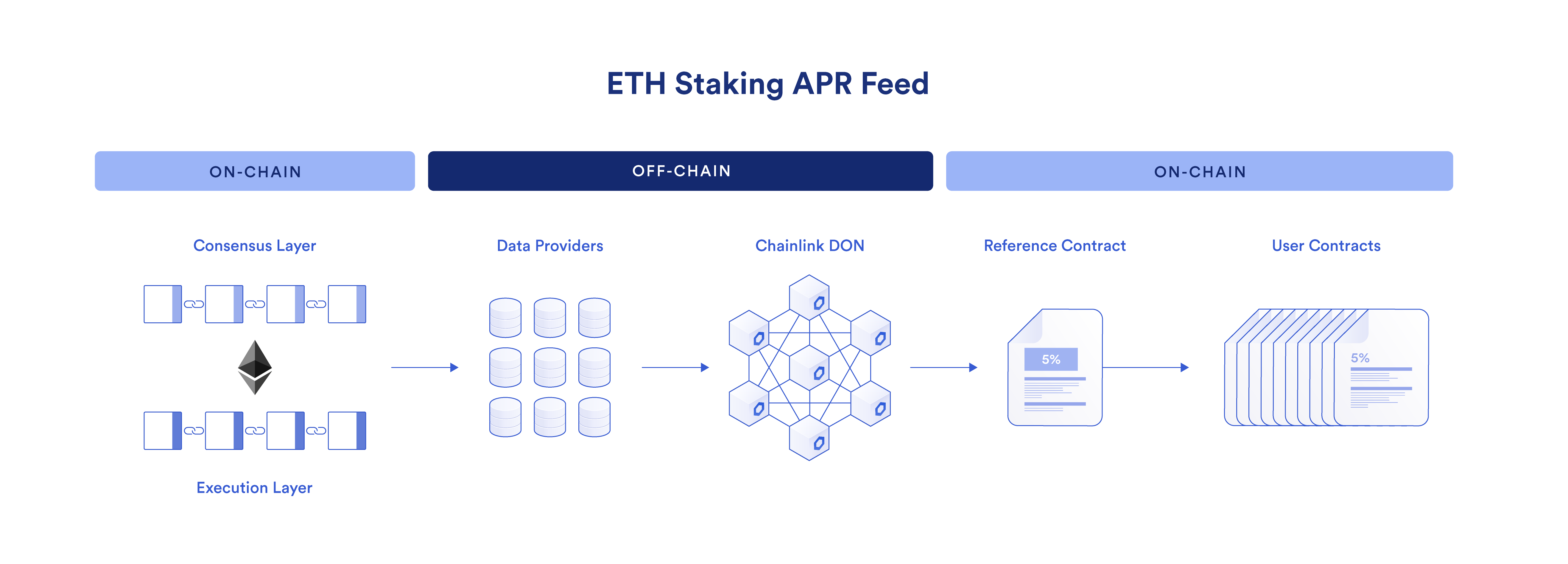
Product Description
Chainlink Data Feeds and products provide smart contracts with a reliable source of truth about an external event such as an asset price change or sports event outcome.
Current Focus
The area of Web3 that we believe has the most growth potential is on-chain finance, particularly with respect to asset tokenization and on-chain derivatives. Tokenized assets offer significant utility compared to traditional assets because they can support faster settlement times, easier transferability/composability, and increased transparency. With more assets coming on-chain—both Web3-native assets and real-world assets—on-chain derivatives markets can accelerate the adoption of Web3.
In support of these emerging markets in on-chain finance, we’re focused on providing key Data Feeds on-chain that enable the pricing, trading, and settlement of tokenized assets and on-chain derivatives contracts.
Recent Deployments
- Established a fee-sharing agreement between GMX and Chainlink where 1.2% of the total protocol fees earned by GMX V2 and future versions will be paid to Chainlink service providers in exchange for the usage of the low-latency oracles and technical support. The GMX community voted in favor of the proposal, with over 96% approval. The beta version of the low-latency oracle is now deployed on the Arbitrum testnet, with testing by GMX core contributors ongoing.
- Deployed three new categories of rate and volatility Data Feeds, which include a Bitcoin Interest Rate Curve on Ethereum Mainnet (1-day, 1-week, and 2-week), ETH Staking APR Data Feeds on Ethereum Sepolia Testnet (30-day and 90-day), and Realized Volatility Data Feeds on the Ethereum Sepolia, Arbitrum Goerli, Avalanche Fuji, and Polygon Mumbai testnets. These data products are foundational to growing the on-chain derivatives market, particularly by helping support interest rate swaps, volatility options, and futures contracts. There have already been 40+ testnet feed deployments with these feeds.
- The Celo community voted to join the Chainlink Scale program, with a 99.9% approval in an on-chain vote.
What’s Next
- Continue developing the low-latency oracle solution and deploy feeds on Arbitrum mainnet for GMX V2 and then for general availability.
- Expand rate and volatility data feeds to multiple different blockchain mainnets.
- Expand Chainlink Data Feeds to new blockchains, with prioritization based on market demand and blockchains joining the Scale program.
- Support new asset types, including real-world assets like FX and commodities.
Functions
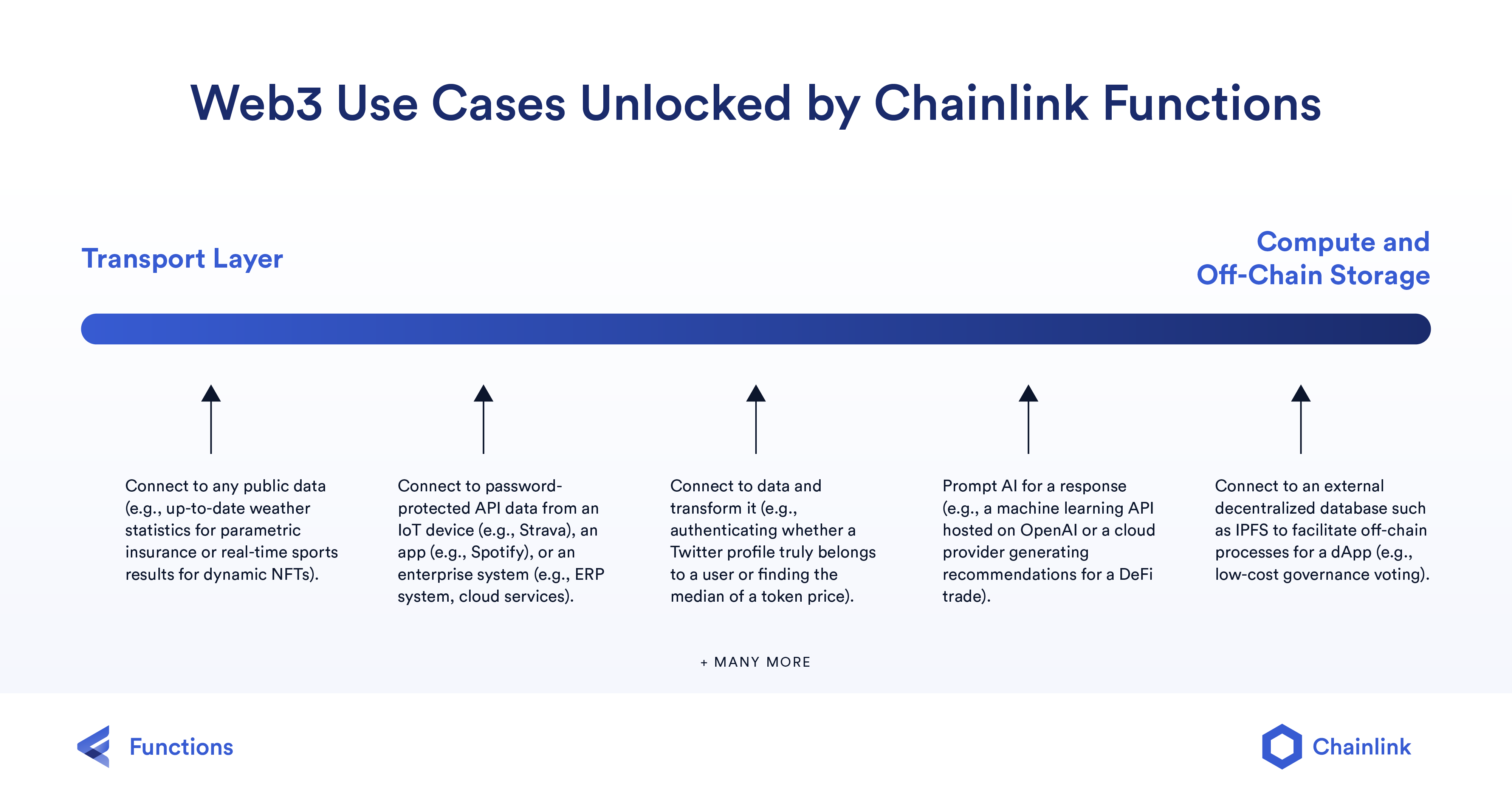
Product Description
Chainlink Functions is a Web3 serverless developer platform that allows developers to connect their smart contracts to any external data source and run custom computations in minutes.
Current Focus
Since the Chainlink Functions Beta launch on Polygon Mumbai and Ethereum Sepolia testnets at ETH Denver, 2,200+ applicants have joined the beta. There were 1,000 applications within the first two weeks of launch and 435 from the Chainlink Spring Hackathon. The testing period has produced a plethora of feedback and sparked a number of interesting new use cases, such as Space and Time creating dynamic NFTs. We’ve also seen a variety of new data sets fetched using Functions, such as U.S. Treasury yield for specific maturity and intervals, Google Maps distance between locations, and current flight statuses.
Recent Deployments
- Expanded the Chainlink Functions Beta to Avalanche testnet.
- Delivered a Functions Masterclass with over 1650 registrations, training developers on how to build their first Chainlink Function.
What’s Next
- Improve the developer experience by making it easier for developers to trial and explore Chainlink Functions quickly.
- Continue collecting developer feedback during the beta period to enhance the developer experience and product impact. Feedback is crucial in determining the optimal path for deploying Chainlink Functions on blockchain mainnets for general availability.
Proof of Reserve
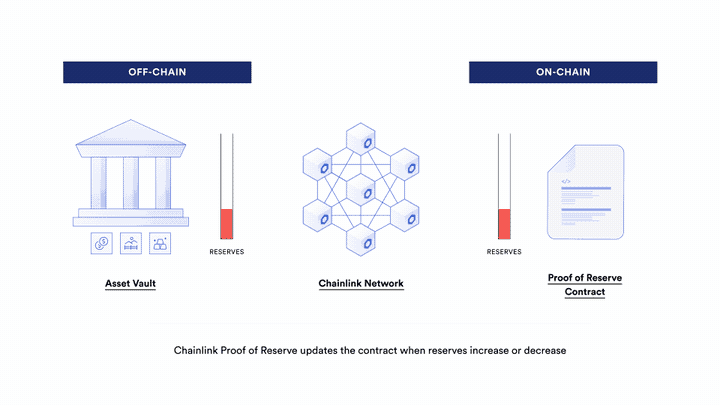
Product Description
Chainlink Proof of Reserve provides autonomous, reliable, and timely verification of cross-chain and off-chain reserves that back tokenized assets.
Current Focus
Areas of particular focus for Chainlink Proof of Reserve are real-world assets (RWAs) and liquid staking tokens (LSTs). For real-world assets to be reliably used on-chain, they need Proof of Reserve data feeds that attest to their backing by assets held off-chain or cross-chain. Furthermore, the increase in liquid staking tokens, such as those for ETH, has created a need for Proof of Reserve to ensure they are backed one-to-one in staking contracts.
Recent Deployments
- Launched the first Proof of Reserve Data Feed for a liquid staking token via an integration with Swell Network. This new use case for Proof of Reserve provides enhanced transparency and security for a DeFi ecosystem increasingly utilizing LSTs.
- Launched the first Proof of Reserve Data Feed for a real-world asset index token via an integration with Alongside Finance.
“Extreme transparency is at the core of Alongside, and Chainlink Proof of Reserve helps us deliver that.” —Austin Diamond, Co-Founder at Alongside
What’s Next
- Expand the integration of Proof of Reserve with real-world assets (RWAs).
- Expand the integration of Proof of Reserve with liquid staking tokens (LSTs), particularly as a way to support assets moving cross-chain.
- Expand the integration of Proof of Reserve with stablecoins, including fiat assets beyond US dollars, such as by permitting or restricting minting based on the off-chain reserves reported.
DECO
Product Description
Chainlink DECO is a privacy-preserving oracle protocol that enables individuals and businesses to prove the provenance of data coming from a particular data source to an oracle, as well as prove arbitrary statements on that data in zero-knowledge.
Current Focus
The Chainlink Labs Research team continues to improve and harden the underlying technology and develop integration patterns for real-world applications based on input from the developer community. In the recent DECO research series, we dive into the process of progressing DECO from an academic publication to a product, as well as how it makes use of an interactive zero-knowledge core and some of the optimizations aiding its real-life deployment.
What’s Next
- Continue developing a builder-friendly sandbox environment for developers to apply privacy-preserving proofs of authenticity via DECO around data sources of their choice.
Compute
Automation
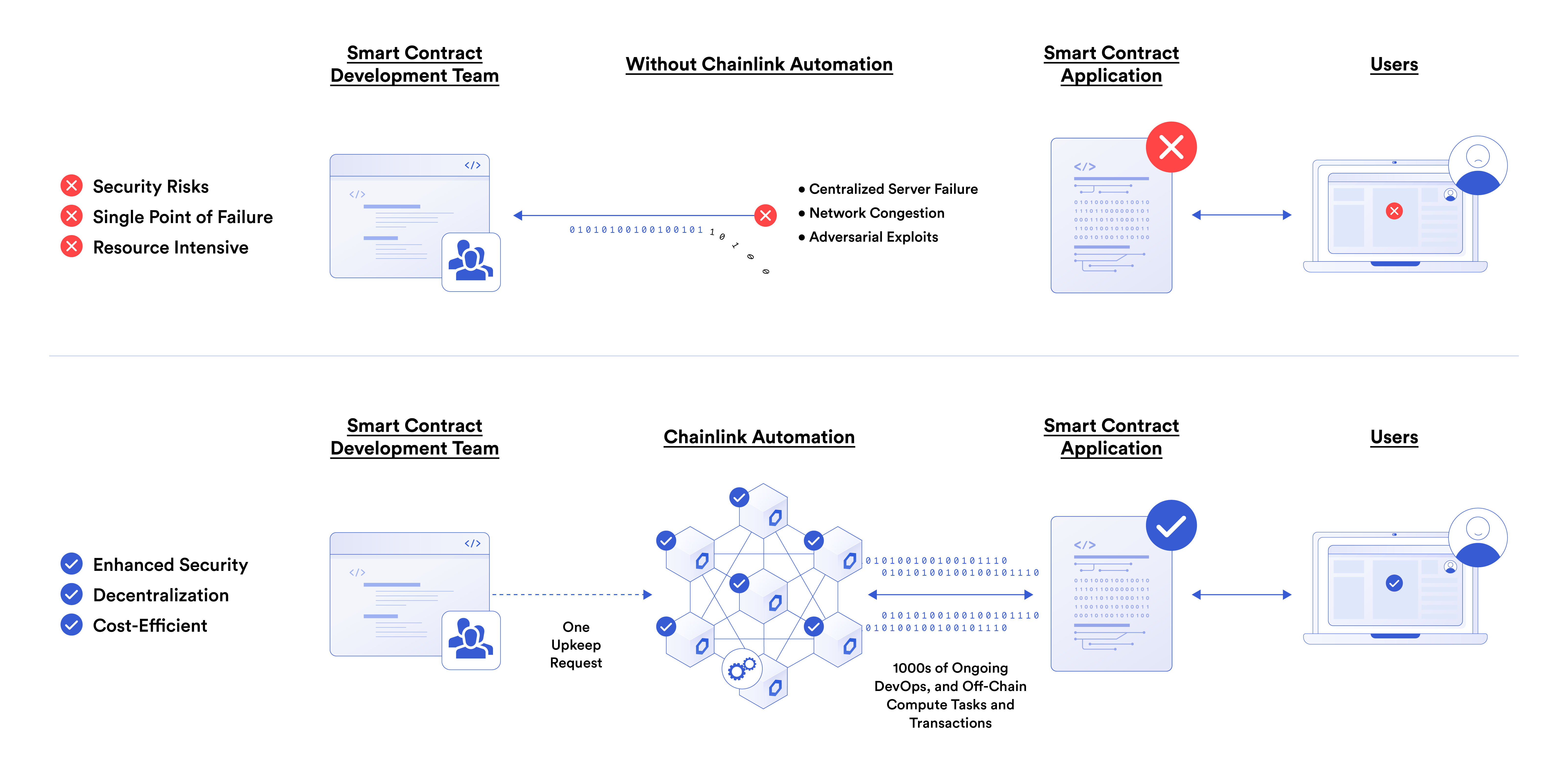
Product Description
Chainlink Automation is a highly reliable and performant smart contract automation solution for developers wanting to outsource DevOps-related tasks in a decentralized manner.
Current Focus
Every smart contract backing a service that must be triggered requires an automation solution. Chainlink Automation is focused on removing the need for projects to self-host automation infrastructure by providing them with a highly reliable and decentralized alternative. The ecosystem is quickly realizing that it’s not just about automation but also reliability, since automation triggers key processes that must take place in a timely manner. Learn more by reading the blog post: Why Does Your Automation Infrastructure Need To Be Decentralized, Not Just Distributed?
We’re also focused on Automation becoming a powerful tool to combine with other Chainlink services that then enable new use cases. For example, combining Proof of Reserve and Automation can support circuit breakers, while combining VRF and Automation can empower NFT batching.
Recent Deployments
- Launched Chainlink Automation on Optimism mainnet, which saw early adopters BarnBridge, DefiEdge, Lyra, and Pickle Finance unlock use cases such as limit orders, automated settlement of options contracts, timely liquidity re-balancing, and regular yield harvesting.
“We’re excited to integrate Chainlink Automation to increase the performance of the Lyra protocol! Using Chainlink’s decentralized automation network, we can help ensure the settlement of options contracts is never delayed or missed.” —Josh Kim, Senior Developer at Lyra
- Launched the beta for Chainlink Automation 2.0, which transitions the protocol from a turn-taking model to a consensus mechanism, on multiple testnets (Ethereum, BNB Chain, Polygon, Avalanche, Fantom, Arbitrum, and Optimism). The decentralized consensus mechanism improves Automation’s security and reliability while reducing transaction costs via the elimination of on-chain recalculations. The result is users having stronger protection from potentially malicious nodes since upkeeps will trigger on-chain transactions only after multiple nodes in the network agree to the parameters.
What’s Next
- Make Chainlink Automation 2.0 generally available on mainnet so all users can benefit from improved security guarantees and reliability.
- Expand Chainlink Automation’s available triggers to enable more use cases and continue powering the flywheel.
- Enable developers to build faster by providing examples and templates of how to use Chainlink services together to enable specific use cases.
VRF
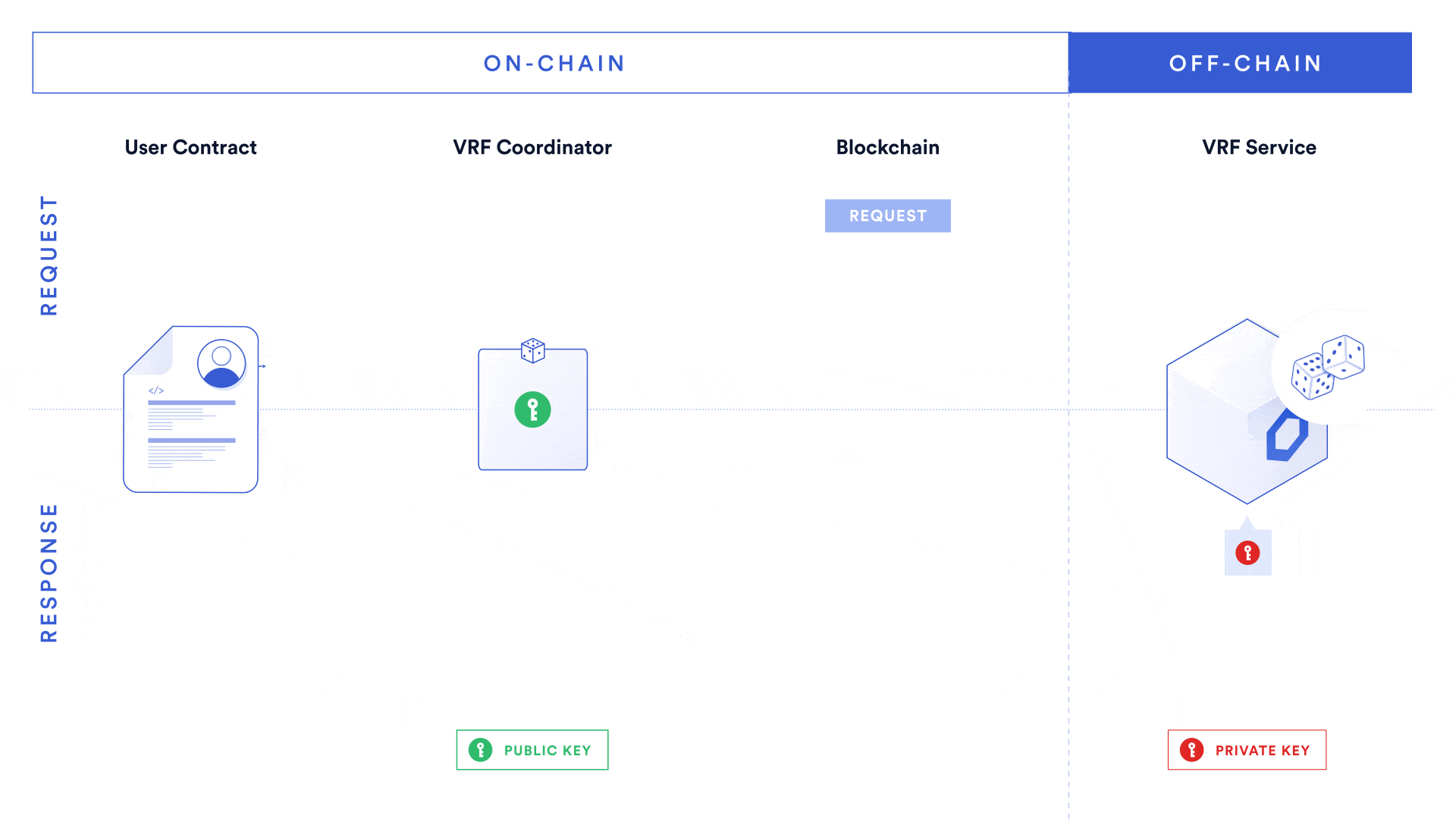
Product Description
Chainlink Verifiable Random Function (VRF) is the industry-standard source of provably fair and tamper-proof randomness.
Current Focus
Chainlink VRF is Web3’s most widely adopted random number generator (RNG), having fulfilled more than 15.8 million request transactions and currently providing verifiable randomness to more than 6,300 unique smart contracts across multiple blockchains. Our goal is to build upon the foundation of VRF by making it faster, more efficient, and cheaper so it’s not only widely adopted inside Web3 but throughout Web2 as well. We have already achieved end-to-end latency of close to two seconds, opening up use cases that demand high-speed responses.
Recent Deployments
- Deployed Chainlink VRF on Arbitrum mainnet. This workshop illustrates the speed of VRF demonstrated through this new deployment.
“Chainlink VRF is a time-tested solution, and its transparency and security is a welcome benefit for Arbitrum users. We look forward to the innovation this sparks with our community and continuing our work with Chainlink Labs in the years to come.” —A.J. Warner, Chief Strategy Officer at Offchain Labs
- Added support for new SDKs, particularly through an integration of Chainlink VRF in Thirdweb’s Pack Contract, which many gaming projects utilize.
- Announced that Lotte Corporation—a South Korean multinational conglomerate corporation with over 90 business units across Asia, Europe, North America, and Australia—will utilize Chainlink VRF for the Lotte Group’s NFT projects.
What’s Next
- Continue developing a new version of VRF (V3), which will feature a new architectural design and improved UX.
- Launch VRF accelerators, which consist of a library of templates and tools that speed up the development process for users.
FSS
Product Description
Fair Sequencing Services (FSS) is a transaction ordering solution that aims to mitigate harmful forms of maximal extractable value (MEV) in order to help decentralized systems become fundamentally fairer.
Current Focus
The research team has been working on improving the performance of the FSS system and its adaptability to other use cases and deployment models. Additionally, the team is exploring the benefits of protected order flow (PROF), an approach to transaction ordering that is compatible with FSS.
Cross-Chain
Cross-Chain Interoperability Protocol (CCIP)
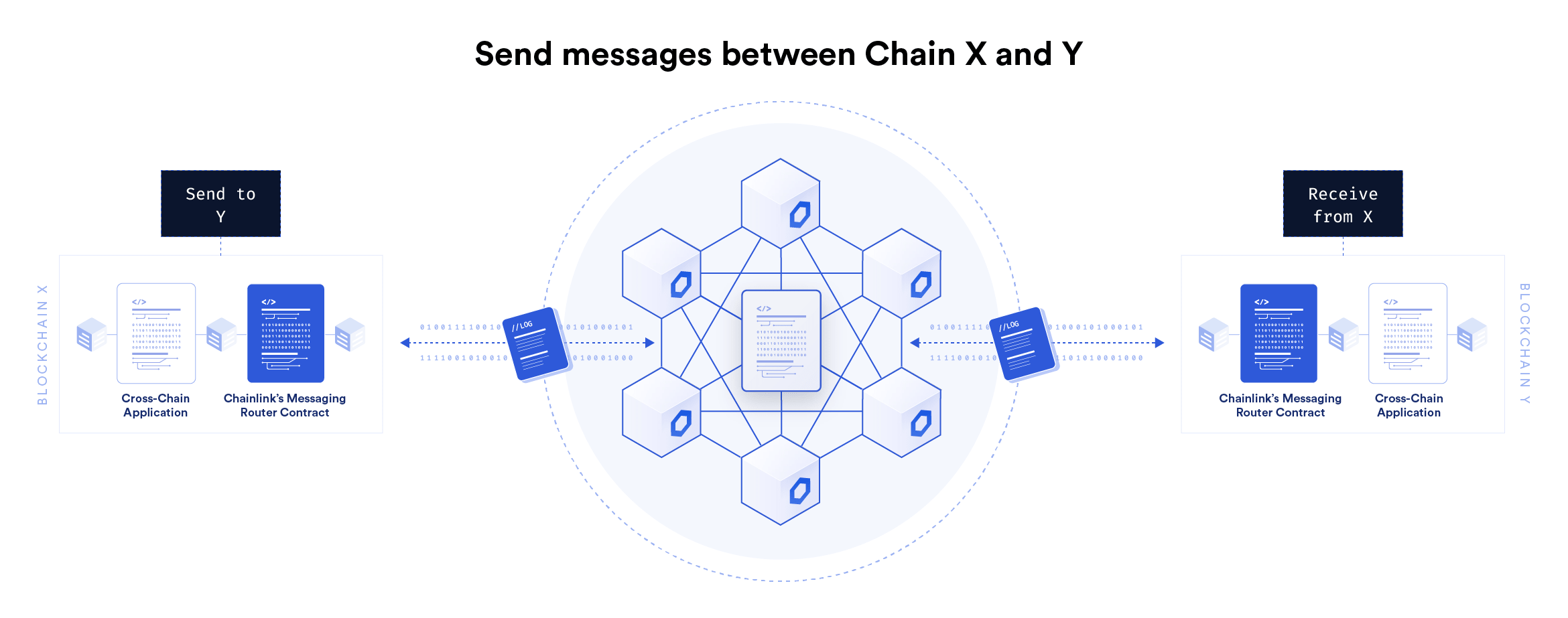
Product Description
Chainlink Cross-Chain Interoperability Protocol (CCIP) is a global standard for cross-chain communication that establishes a universal connection between any public and private blockchain so that arbitrary data, tokens, or instructions alongside tokens (i.e., programmable token transfers) can be transferred between chains.
Current Focus
As previously mentioned in the Q1 product update, CCIP is currently being tested across a variety of use case implementations on a number of blockchain testnets in preparation for mainnet rollout.
Recent Deployments
- Completed the first CCIP code audits, which include a recent Code4rena crowdsourced audit contest. Additional audits are ongoing.
- Continued testing iterative product upgrades with beta partners across five testnets and a diverse range of use cases.
- Announced that Chainlink is working with Swift and more than a dozen major financial institutions to enable connectivity to and interoperability across public and private blockchains. Institutions and financial market infrastructures include Australia and New Zealand Banking Group Limited (ANZ), BNP Paribas, BNY Mellon, Citi, Clearstream, Euroclear, Lloyds Banking Group, SIX Digital Exchange (SDX), and The Depository Trust and Clearing Corporation (DTCC). Chainlink CCIP will be used as an abstraction layer to securely connect existing infrastructure to blockchains while also enabling complete interoperability between source and destination chains.
“There’s unlikely to be a single prevailing blockchain network … That’s why the community is working with Swift to develop an interoperability model that would enable access to different platforms globally.” —Tom Zschach, Chief Innovation Officer at Swift
What’s Next
- Complete additional CCIP security audits to ensure a high level of security before initial mainnet deployments.
- Continue to test CCIP in the real-world use cases of beta partners and onboard additional beta partners.
- Launch on mainnet, with early access for users in the testing program prior to the general availability launch.
Chainlink Developer Community
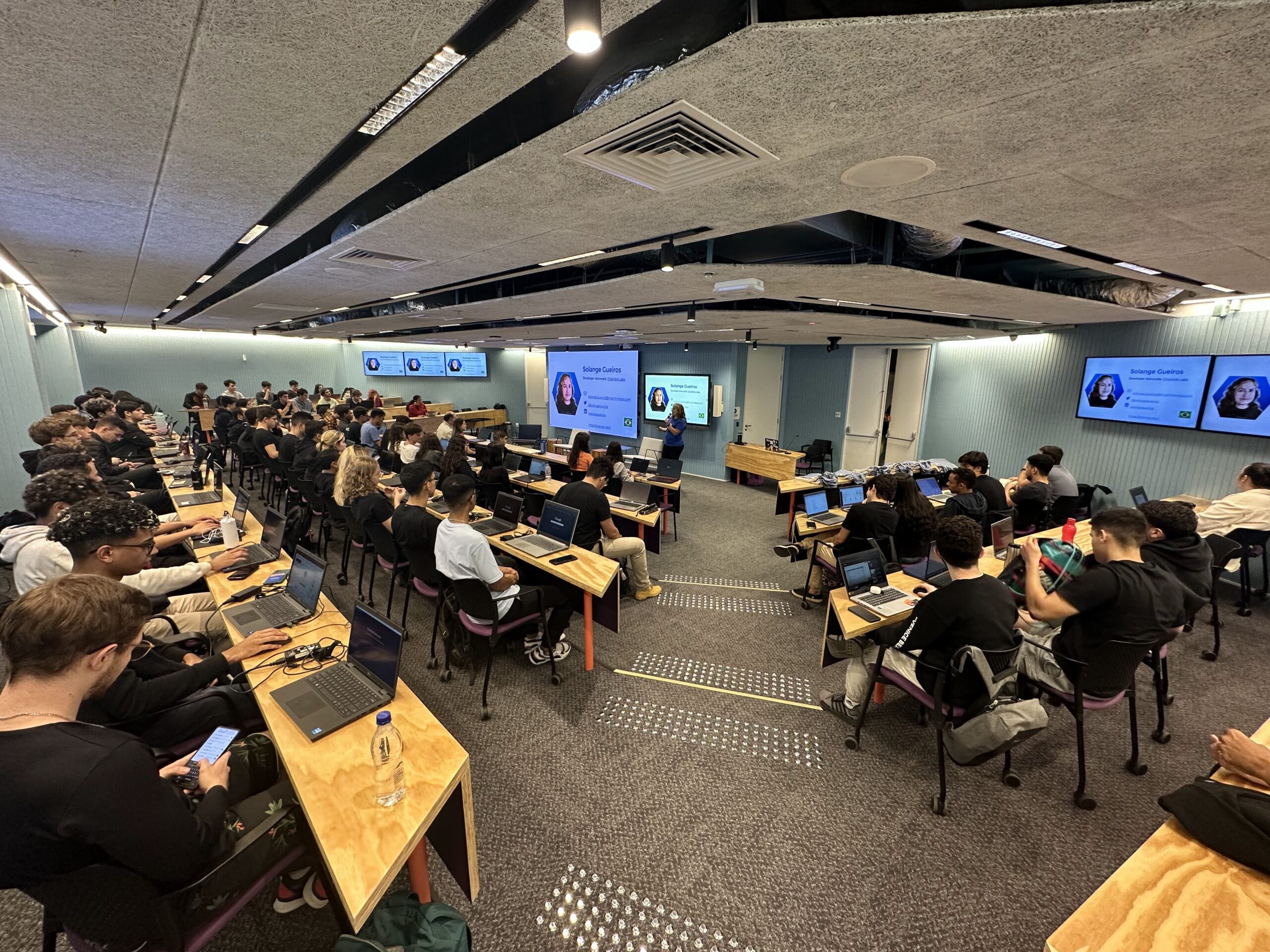
It’s been a busy quarter for builders! Below are some of the most important Q2 events, workshops, tutorials, and dev tools made available to the Chainlink developer community, as well as what’s upcoming.
If you are building something cool, we want to know about it! Please share your newest builds with our developer community in the Chainlink Official Discord.
Recent Updates
We recently wrapped up our Spring 2023 hackathon, which was our biggest event yet with over 13,000 registrations and 496 projects submitted. Some workshop highlights include:
- Integrating ChatGPT with decentralized applications using Chainlink Functions
- Rates and Volatility Data Feeds
- Pulling Data from AWS on-chain
- Using Chainlink Services in your Web3 or mobile game
Developer Advocate Zubin Pratap ran a virtual Chainlink Functions Masterclass, where almost 200 developers learned how to build a dApp that uses Chainlink Functions to pay out an artist based on Spotify streams.
Chainlink Labs Developer Advocates hosted and supported a number of external hackathons and events:
- Developer Advocate Frank Kong presented at the Hong Kong Web3 Festival.
- Chainlink cosponsored the BNB Zero2Hero hackathon, where prizes were awarded to the best projects that used Chainlink.
- Chainlink was a sponsor at EthLisbon Hackathon and awarded prizes to the best smart contract solutions using Chainlink. Chainlink Labs Developer Advocate Solange Gueiros also hosted a workshop preparing the hackers to use Chainlink before the hackathon started.
- Chainlink was a sponsor at the ETHSamba Hackathon, coordinating a full-day bootcamp and awarding prizes to the best projects that used Chainlink.
- Developer Advocate Solange Guieros ran a Chainlink Bootcamp on June 12 in Salvador, BA, Brazil.
- Developer Advocates Andrej Rakic and Solange Gueiros presented at ETH Belgrade and ran a Chainlink Functions workshop.
A Chainlink Community Grant was awarded to support the creation of a Web3.js Chainlink Plugin, a Dev3 Chainlink SDK, and a Chainlink Functions Demo dApp.
Chainlink Community Managers and Community Advocates ran a number of developer bootcamps and workshops around the world with the support of the Chainlink Labs Developer Relations and Community teams:
- An Online Chainlink Bootcamp was held for the Spanish Community, with 1459 attendees.
- A Chainlink Vietnam Online Bootcamp was held in Vietnam.
- A Chainlink Bootcamp was held in Sao Paulo, Brazil.
- A Chainlink Bootcamp, run in collaboration with Google, was held in Bangkok, Thailand.
- A Smart Contract Developer Bootcamp was held at Singapore Management University.
- Build with Chainlink – 杭州站 events were hosted in Hangzhou, China.
- A Link Web3 to HUST – 武汉站 event was held in Wuhan, China.
- A Chainlink class for deaf individuals was hosted online by Chainlink Community Manager Jeff Beltrão.
- A Smart Contract Developer Bootcamp, Smart Contract Workshop, Zero Knowledge Workshop, Introduction to Cryptography Workshop, and Chainlink Turkey Hackathon Connect were hosted by Chainlink Turkey
Chainlink community in-person workshops and enthusiast events continue to set the standard in Web3 and beyond. Over 65 events were held globally, which included 2500 attendees, resulted in 1,000+ testnet deployments, and featured sponsorships by enterprise companies such as AWS, EY, Google, Meta, and PwC. They also provide a platform for Build partners to showcase their projects and vision to a wider audience. Learn more about Chainlink Events at https://events.chain.link/.
What’s Next
- Chainlink Labs will be running two-day bootcamps at Chinese Universities, including Fudan University and Nanjing University of Science and Technology. Chainlink will be sponsoring ETHGlobal Paris on July 21-23. Hackers will have the opportunity to build projects with Chainlink, with up to $10,000 in prizes.
Conclusion
We have laid out our vision for the Chainlink platform and we remain heads down executing against it. We have seen strong progress in Q2 and we’re very thankful to our users and community. We remain dedicated to unlocking the full potential of Web3—the creation of a world where fairness, accuracy, and reliability are guaranteed in our digital interactions instead of merely promised by a “just trust us” statement.
Thank you to everyone building and supporting Chainlink. We look forward to continuing to work together to build a world powered by truth.
